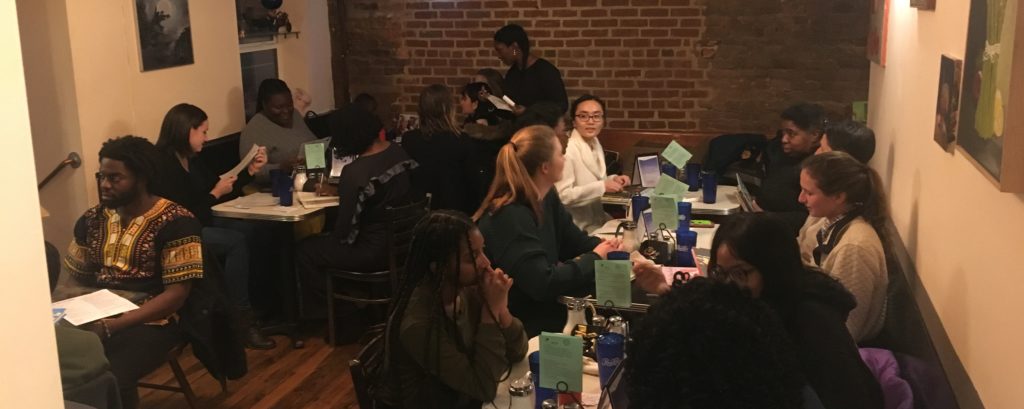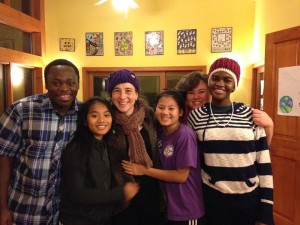Many people feel stuck when considering taking action because of fear and undefined/ill-defined risk. If privileged people can identify where our reserves and resources are, and what risk we take on, we can be more expansive and effective in our social justice work. Thinking through risk helps us to expand our diversity of tactics. Sometimes the imagined consequences of new actions are more than the actuality.
N.B. I know that many people do not have the privilege and luxury of calculating risks. I see and honor the work of People of Color, particularly Black Women, who have been leading in this work for generations. This post is written to encourage those reluctant in their privilege to begin taking more risk to build the world that we want to see.
Social Risk
Social risk happens when we feel like our families, friends and/or group isn’t going to like or accept us any more because of new and/or political stances or actions. I think that this is the silent killer of action. When you begin voicing different opinions, or stand up to your identity, you may be afraid that relationships can end. That is hard; particularly if you already feel socially isolated. You’re able to take on more social risk when you feel confident in your breadth and depth of relationships. Social risk can look like bringing up taboo topics in conversation, sharing articles that have a political point of view, challenging wrong assumptions, or ending friendships that have or feel like that have social or other value. The bright side of ending relationships that don’t feel aligned with your social justice goals, is that it can open up energy and time for more supportive relationships. It can also be a risk to join new events/movements. It can feel that you’re not far enough on your journey to be able to join a new social justice event or movement. It’s okay. Meeting new people can be hard. Sometimes people can be welcoming and ready to invite you in. Sometimes people can be tired, and nervous about meeting a newcomer themselves, particularly if you’re joining the group after a traumatic event. When you’re new, it’s a good time to be a listener, learner, and your most authentic self, including practicing saying “thank you” and “I didn’t know”.
Physical Risk
Having a physical presence in the streets is so critically important for to show our strength in numbers, to create obstacles to the status quo, and to bring us together in solidarity, yet it can be a risk that many feel that they cannot take on. For people who are differently abled, have mobility issues, have invisible illnesses, are more likely to be targeted by LO, have an outstanding warrant or previous charges, have undocumented status, are suffering from trauma and/or anxiety, or are the primary caregivers for children, the elderly, or anyone else, the logistics and physicality of physical presence can be overwhelming. If you feel that you cannot participate for any of the reasons mentioned, or others, including fear of police incitement, targeting, and escalation, there are other ways to get involved. There is need for on- and off-site community care, legal observers, communications, amplification of online messaging, etc. in most public actions. Because physical action and work is often the most visible, those of us who feel that we can’t participate in one or all on-the-ground actions feel left out or that we’re not doing enough. There’s lots of work.
Professional Risk
Professional risk lives next door to social risk. When you begin talking out about things that you feel strongly about, and holding others accountable for justice and equity in the workplace, there may be consequences including denial of responsibilities, raises, promotions, networks, invitations for speaking, conferences, and on and on. Seek out support for your work within your professional sphere– a caucus, so to speak– to help you and others speak out and up. Expect that some will applaud your efforts, and other feel threatened. You may find that your fear of reprisal (particularly, the more privilege you hold) was overblown. If you see that others are facing consequences due to their advocacy for justice, make sure to support them both privately and publicly.
Emotional Risk
It is a risk to care. Our emotional health is taxed daily. This is on purpose. I first drafted this in cold, sunless January of 2020. Then, a friend needed rent money. The impeachment trial– which was ultimately toothless– was on the radio. Now it’s June and there’s a pandemic, and an uprising, and it is a time of emotional chaos. To make the emotional connection with our own trauma and lack of agency in this system is hard enough– to make emotional connections to support and heal one another can feel overwhelming. Yet, I’d encourage you to open yourself up to hearing stories that others wish to share about their own journeys. If you can access therapy, counseling and mental health support, go. If you have access, work to make sure that everyone has access to excellent, affordable/free mental health support. I’ve also come to realize the emotional risk of telling the truth to yourself about family, resources, relationships, etc. Reconciling your ideal values with your concrete actions requires emotional risk and work.
Legal Risk
When we recognize that the legal system is built for White Supremacy, we can choose to to push the boundaries of that system in service of Black Liberation. Our networks often include police officers, judges, lawyers, and their spouses, and other family. We get waved along during inspections. We get free consultations and payment plans. We get our privacy protected. We’re seen as respectable and safe. How do we extend protections? How do we use this privilege to smash the systems of inequity.
Financial Risk
Taking on more financial risk one of the most important and available opportunities to us with greater financial stability. Financial stability is NOT only having cash in the bank– lots of people with privilege are struggling to pay bills, and do not feel that they can give as much as they like. Wealth is not only money, but it is also property, networks of relatives, available credit, banking relationships, etc. One example of taking on financial risk is co-signing a credit card with someone who has no or poor credit history. It is possible to limit your financial risk, while helping someone access the benefits of a higher credit score. Assessing your threshold of financial risk could allow you to give more money, altering working hours in order to dedicate more time to unpaid community work, offer services on a sliding scale, etc.
To close, I’ll share this FB post from Scott Woods via Wear Your Voice Magazine
Speaking out puts you outside the pale of polite spaces.
Speaking out costs you opportunities, gigs, and jobs.
Speaking out suggests that you have time to waste, that you don’t have certain things.
Speaking out costs you friends and lovers and camaraderie.
Speaking out generates as much loneliness as it does attention.
Speaking out makes you “that” cat.
Speaking out means there are people you won’t get to meet once you speak, but who will have an opinion of you anyway.
Speaking out makes you a target, makes you susceptible to judgment, makes you vulnerable to people and systems alike.
Speaking out will dry up your associations and make you a pariah, force you to wear the scarlet tweet in your world.
Speaking out may cost you your world.
Speaking out makes an argument out of nothing, makes a fight last a year.
Speaking out gets you uninvited to parties.
Speaking out gets you invited to meetings that only want to co-opt your presence because speaking out makes them look like they’re speaking out too.
Speaking out gets you dismissed, gets you fired.
Speaking out can make you poor.
So if you’re out here arguing that someone speaking out doesn’t cost them anything, you’re probably wrong.

















